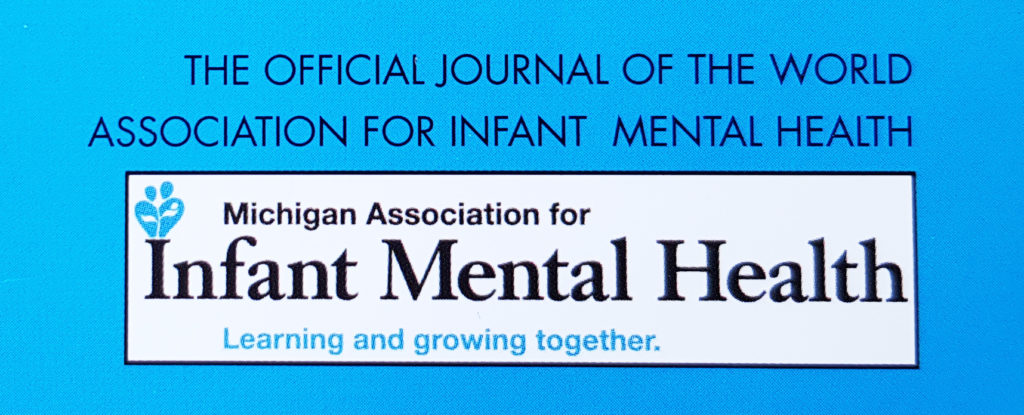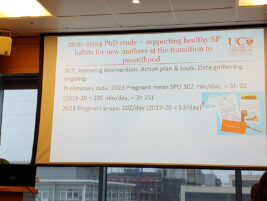Introduction
The Infant Mental Health Journal (IMHJ) with Perspectives in Infant Mental Health, have teamed up to feature IMHJ articles that especially draw attention to themes in practice with very young children/families. The aim of this new column is two-fold: to draw the attention of the Perspectives readership to new IMHJ papers; and to collaborate together to disseminate Infant Mental Health content to the field. To this end, the IMHJ editor selects published papers and then invites authors to consider if they would be like to be part of this initiative.
The first paper to be featured in this ongoing series is by Rachel Ransley, Michelle Sleed, Tess Baradon and Peter Fonagy (UK): “‘What support would you find helpful?’ The relationship between treatment expectations, therapeutic engagement, and clinical outcomes in parent–infant psychotherapy”. We would very much like to thank each of these authors for engaging with us in this initiative and for preparing this overview of their paper.

“‘What support would you find helpful?’ The relationship between treatment expectations, therapeutic engagement, and clinical outcomes in parent–infant psychotherapy”: An overview of a recently published paper in the IMHJ
By: Rachel Ransley, Michelle Sleed, Tess Baradon and Peter Fonagy (UK)
Author(s) Affiliation:
Rachel Ransley, Michelle Sleed, Tess Baradon, and Peter Fonagy
University College
London, United Kingdom
The Anna Freud National Centre for Children and Families,
London, United Kingdom
University of Witwatersrand
Johannesburg, South Africa
Key question/s:
What are the associations between pretreatment expectations and clinical outcomes and engagement in Parent-Infant Psychotherapy?
Overview of Methods:
Sixty-one mothers of infants participated in interviews about their treatment expectations as well as interviews to assess reflective functioning prior to the start of treatment. Mothers also completed questionnaires assessing parenting stress, depressive symptoms, and sense of mastery prior to treatment, after treatment, and again at a 12-month follow up. A mixed methodology was used to examine participants’ expectations through transformation content analysis of pretreatment interviews; recurring themes were classified and quantified. Further statistical analyses explored relationships between the quantified themes of parental expectations, clinical outcomes, and engagement in treatment.
Summary of key findings:
How are parents’ expectations about parent-infant psychotherapy (PIP) related to outcomes? Researchers asked parents to describe their expectations about participating in parent-infant psychotherapy. No significant independent correlation was found between expectations and engagement. Yet, one of the six clinical outcomes significantly correlated with parental expectations. Those parents whose expectations centered on improving relationships with their infants through treatment, and who expressed concerns about discussing past experiences, had improved reflective functioning after treatment. These results indicate that PIP may be more effective for some mothers than others and that assessing future clients’ expectations before beginning PIP may be beneficial.
Implications for families/practitioners/ further research:
Participants who held the expectation that treatment would improve their relationship with their infant and who also expressed their concern about speaking about past experiences were more likely to have improved RF after the intervention. This finding offers a new insight into the efficacy of PIP, particularly as the variables uniquely predict improved RF as well as improvements together within a regression model. Although no association was found between expectations and engagement within this study, half of the participants did prematurely drop out of treatment in the eyes of the therapist. Therefore, one must consider the individual perspectives that each parent holds and how this will impact engagement. By ensuring that clinicians explore the potential barriers to treatment or misguided expectations that a client may hold, they will be able to help the client be prepared for PIP. This research highlights the importance of clinicians having specific conversations with clients before they begin PIP. A specific pre-treatment interview/questionnaire could potentially help the clinician become more aware of potential barriers or highlight if the client holds expectations of treatment that are indicative of clinical change. In particular, it could explore clients’ views about discussing their past experiences and desires to improve the relationship with their infant, which as the findings from this study suggest, are often indicative of improvements in RF.
Full paper citation (in APA):
Ransley, R., Sleed, M., Baradon, T., & Fonagy, P. (2019). “What support would you find helpful?” The relationship between treatment expectations, therapeutic engagement, and clinical outcomes in parent–infant psychotherapy. Infant Mental Health Journal, 40(4), 557-572.
“‘What support would you find helpful? ’ The relationship between treatment expectations, therapeutic engagement, and clinical outcomes in parent–infant psychotherapy”: An overview of a recently published paper in the IMHJ. Perspectives in Infant Mental Health Vol. 28 No. 1 | Spring/Summer 2020.
Authors
By Maree Foley, Switzerland (Editor Perspectives in Infant Mental Health) and Holly Brophy-Herb USA (Editor IMHJ)








